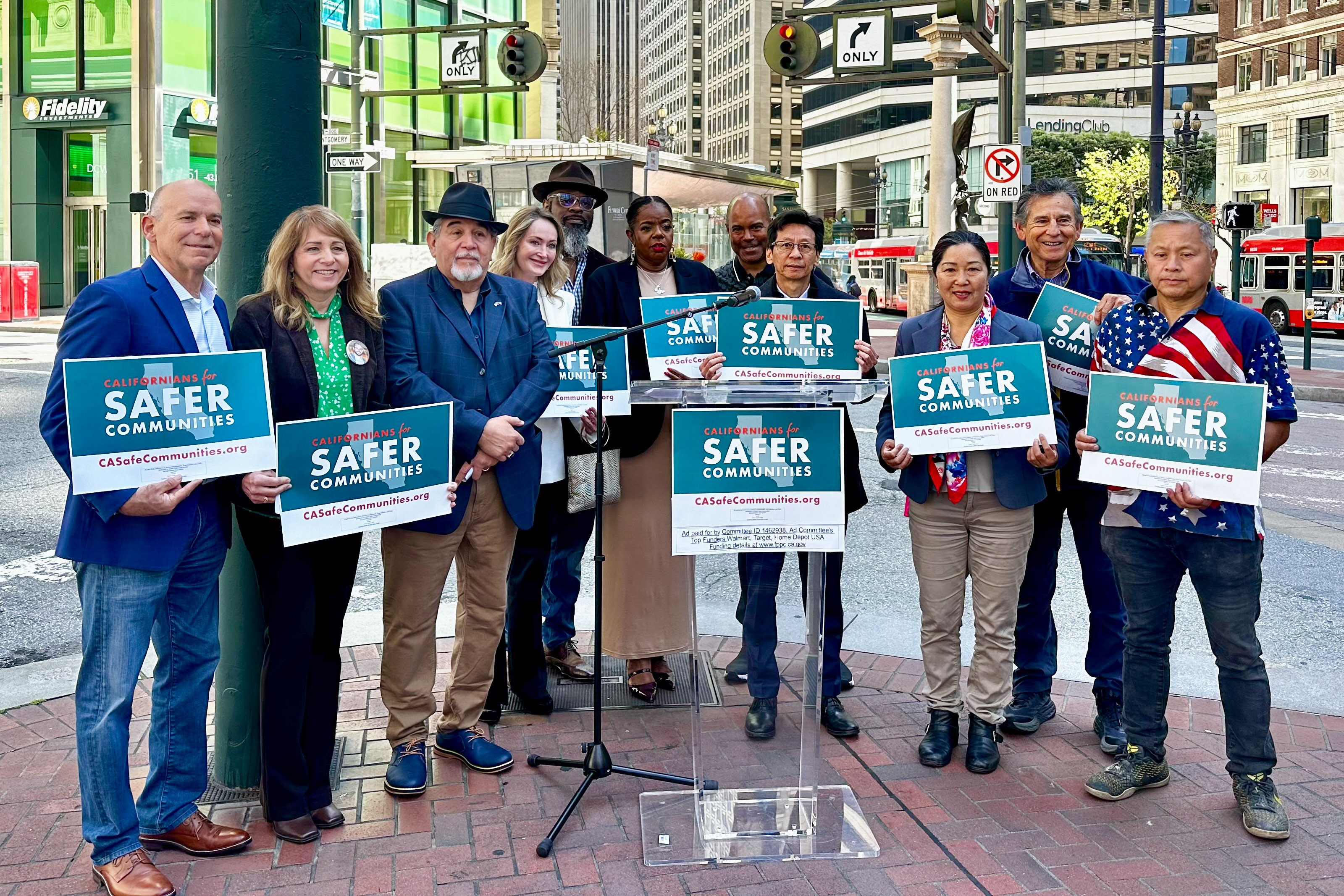Californians could get a chance to amend Proposition 47—a law passed by voters in 2015 that lessened some drug and theft crimes from felonies to misdemeanors—with more than 900,000 signatures collected to place the issue on the November ballot.
Voters will decide if penalties should be increased for some of those crimes.
“We must prioritize the safety of our communities. This proposed ballot measure does just that, fixing prior legislation that has harmed public safety. ... It is time for common sense [reform] that holds people accountable for their criminal behavior and ensures justice for our community members,” Riverside County District Attorney Michael Hestrin, a law enforcement representative for the initiative, said in an April 18 statement announcing the recent milestone.

Riverside County District Attorney Mike Hestrin speaks at a press conference in Riverside, Calif., on Jan. 18, 2018. (David McNew/Getty Images)
The Californians for Safer Communities Coalition, which spearheaded the signature gathering, has now submitted nearly 1 million signatures to qualify for the ballot, according to Mr. Hestrin’s office. The signatures will now be validated by the California secretary of state. The group needs 546,651 valid signatures to move the issue forward.
Known as the Homelessness, Drug Addiction, and Theft Reduction Act, the ballot initiative, if approved, would revise Prop. 47 to increase criminal penalties for repeat offenders of theft and certain drug crimes while incentivizing those arrested for the latter to participate in and complete drug treatment programs.
The coalition consists of several law enforcement groups, justice and victim advocacy groups, veterans, taxpayer organizations, and more, including the California State Sheriffs, Police Chiefs, and District Attorneys associations.
“We’re at a tipping point. When Californians walk into basic retail outlets and they see products locked up, when they see inventory reduced, store hours reduced, stores in their neighborhoods closing, they have recognized that this is a problem that must be corrected,” California District Attorneys Association CEO Greg Totten told The Epoch Times in a February interview.
San Jose Mayor Matt Mahan said amending Prop. 47 won’t bring back mass incarcerations but instead will mandate treatment for certain crimes.
“We cannot be afraid to challenge the status quo when it is clearly not working for our residents. ... We need reform that doesn’t take us back to the era of mass incarceration but allows judges to mandate treatment for those struggling with severe addiction,” he said in an April 18 coalition statement.
According to law enforcement officials involved in the effort, drug addiction is contributing to an increase in homelessness because addicts face no consequences.
Since the proposition passed, homelessness in California—according to counts by the U.S. Department of Housing and Urban Development—has increased by 51 percent while decreasing by 11 percent in the nation, Mr. Totten said in February.
Under Prop. 47, possession of drugs is a misdemeanor, as is theft below $950 per occurrence, with more than 75 percent of those charged never showing up to court, according to coalition law enforcement officials.
California Assembly and Senate committees have also killed 20 bills aimed at chipping away at Prop. 47—which were sponsored by the California District Attorneys Association—since the proposition passed, according to Mr. Totten.

Local residents attend a Prop. 47 reform signature collection drive-thru event hosted by KFI radio at the Honda Center in Anaheim, Calif., on Feb. 22, 2024. (Mei He/The Epoch Times)

Yorba Linda City Councilwoman Janice Lim attends a Prop. 47 reform signature collection drive-thru event hosted by KFI radio at the Honda Center in Anaheim, Calif., on Feb. 22, 2024. (Mei He/The Epoch Times)
Part of the reason is that the proposition mandates that any attempt to increase penalties for theft or drug crimes requires voter approval.
The ballot initiative largely seeks to bring back felony offenses for repeat crimes as misdemeanors have become all but unenforceable, according to the coalition.
Sacramento County Sheriff Jim Cooper, who supports the change, said in the statement that in November 2023, there were 33,000 outstanding misdemeanor warrants in his county and that the “misdemeanor approach will solve nothing.”
If approved, the initiative would also allow theft amounts to be combined to reach felony thresholds for repeat offenders. Also, three arrests for “hard” possession of drugs such as fentanyl, methamphetamine, cocaine, or heroin would become a felony charge, with the option for mandatory drug treatment to expunge the charges.
In a recent interview with EpochTV’s “California Insider,” former Sacramento County Sheriff John McGinness said he believes that voters were duped when they approved Prop. 47—also known as the Safe Neighborhoods and Safe Schools Act—as its summary called for safer communities.
“It was anything but [that],” he said. “You can literally walk into a retail store every single day of the year and steal $949 worth of merchandise and you will never do a minute in jail.”

Orange County District Attorney Todd Spitzer shaking the hand of a participant for a Prop. 47 reform signature collection drive-thru event hosted by KFI radio at the Honda Center in Anaheim, Calif., on Feb. 22, 2024. (Mei He/The Epoch Times)
Prior to Prop. 47, those arrested or convicted of theft would be charged with a felony for any subsequent thefts, no matter the value of the merchandise stolen, according to Mr. McGinness.
And selling stolen items is one way some Californians have supported their drug habits since the passage of Prop. 47.
According to one homeless man in Orange County’s Stanton area, Legos are the easiest item to resell on marketplaces such as OfferUp.
Noah Menlo, 26, of Hawthorne, told The Epoch Times in an interview in February that he would steal Star Wars-themed Legos from Target stores in Southern California and then give them to a drug dealer to resell as partial payment for drugs. In his case, he would buy counterfeit oxycodone pills.
“I was doing Oxy M30’s, and I was taking the bus to [my dealer’s] house every day. ... On my way there, I would usually stop at a [store] and fill up my backpack. ... Obviously, I didn’t have any way of making money,” he said.
Mr. Menlo said he would calculate the items he stole, plus the cost of tax, to remain under the $950 Prop. 47 threshold to avoid a felony charge and jail time.














